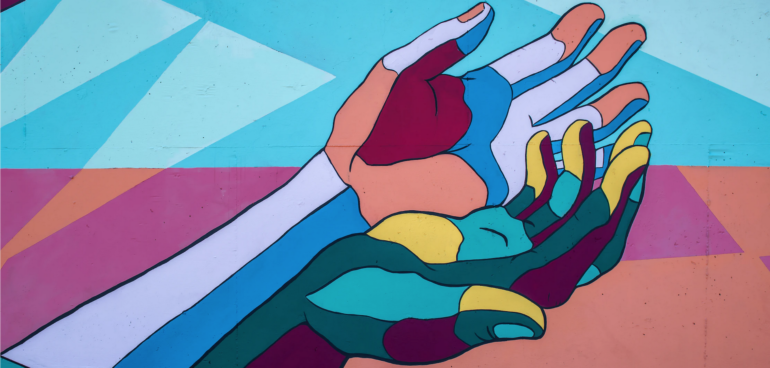
How Can We Heal A Divided Nation?
As I type this, the winner of the 2020 US Presidential is still unknown, and there is no clear indication of when that will change. Both sides are accusing the other of not playing fairly. Both sides have spoken of their certainty that they will prevail. If the divisiveness leading up to the election wasn’t bad enough, a contested winner after a nasty battle, will be even worse. There are some intense days ahead.
Then again, as fractured as we are as a nation, there is something we all share right now: uncertainty.
Which is kind of an interesting thing. Here, one side is warring against the other, filled with acrimony, yet everyone is faced with the same uncertainty. And with uncertainty comes anxiety, insomnia, maybe even dread. While uncertainty in leadership is not good for a democracy, it could be an opportunity to begin healing.
Because while you and your neighbor might not agree politically, you can empathize with his panic now, because you feel it too, and when we understand each other’s feelings, we can start to build bridges.
The Source Of The Divide
There is a lot of finger pointing that goes on when people try to explain how we got to this fractured place. “Trump started this divisiveness,” the Democrats say. “No, you have it wrong,” the Republicans exclaim. “It was Obama who created the rift in our nation.” Next the media will be invoked. “The mainstream media is biased against and hates Trump,” Republicans will declare. “No, mainstream media is fine, it’s the rightwing media that is kooky and conspiratorial,” the Democrats will respond. “Big tech is censoring information,” Republicans will add. To which Democrats will respond, “Only because people are saying false things.” Republicans will then disagree with that.
The question of where to lay blame reminds me of a story in the Talmud (Avodah Zarah 17a) which discusses a man named Elazer ben Durdaya who left an observant life due to his penchant for visiting prostitutes. One day, even one of the prostitutes he was with mocked how low he had fallen in life. Suddenly, filled with shame, ben Durdaya felt a deep desire to repent, and he began to cry out for help.
“Mountains and hills, ask mercy for me.”
“Ask mercy for you? We must ask mercy for ourselves,” they replied.
“Heaven and earth, ask mercy for me.”
“Ask mercy for you? We must ask for ourselves,” answered the heaven and earth.
“Sun and moon, ask mercy for me.”
“Ask mercy for you? We must ask mercy for ourselves.” said the sun and moon.
“Stars and planets, ask mercy for me.”
“Ask mercy for you? We must ask mercy for ourselves,” they responded.
Ben Durdaya suddenly became silent, and after much introspection, he came to profound realization.“Ein hadavar talu ela bi” — “It all depends on me — the responsibility is totally mine!” As he uttered these words through his tears, he passed away. A voice emerged from the Heavens and declared, “Elazer ben Durdaya is worthy of Eternal Life.”
What is the meaning of all of this? Ben Durdaya kept looking elsewhere for the root of his problems. He tried to blame his bad decisions on external forces and not himself. First he appealed to the mountains and hills — symbolizing his parents. They raised him badly. That request fell short. Then he turned to heaven and earth — in an attempt to blame his environment which negatively affected him. This too didn’t work. After that, he went to the sun and the moon, which represent affluence. He tried to claim it was his materialistic life that led him astray. But that too didn’t work. In his finally attempt to look elsewhere for blame, he cried out to the stars and planets — which symbolized being born under the wrong star. But that didn’t work either.
It was only when he probed deeply into his heart that he realized the truth: “There is no one external factor to which I can shift responsibility. Ein hadavar talui ela bi — only I am responsible for my actions.”
Our Takeaway Message
Back to our current political climate – everyone is quick to point fingers when we consider how we got here, but I’d like to make a suggestion: take a look in the mirror.
Have you contributed to divisiveness in any way? Are the leadership, media, and big tech really the only ones to blame?
Have you dismissed another human being solely based on who they voted for? Have you told those who have different political views than you to unfriend you? Have you resorted to snarky interactions and name calling as opposed to sitting down and having nuanced and judgment-free conversations with people on the other side of the aisle? Is there anyone you can point to who you respect and think highly of who voted differently than you?
The fate of the election is not in our hands, but repairing the fracturedness in our country is, and it can begin right away. I understand that there are intense feelings around politics and both sides of the media continuously highlight the worst on the other side. But most people are not the extremes the media keeps showing us; most people are decent. It is up to each and everyone of us to seek the decency and humanity in our fellow citizens and stop giving excuses for why we haven’t yet.
If you found this content meaningful and want to help further our mission through our Keter, Makom, and Tikun branches, please consider becoming a Change Maker today.







